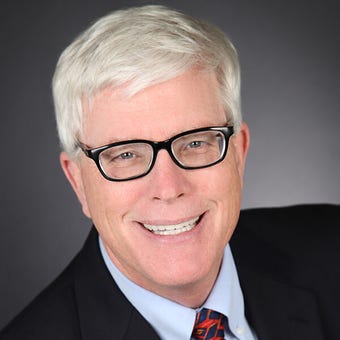'Big issue': Americans reveal their top concerns ahead of the Trump V. Biden debate
Americans who spoke with Fox News Digital detailed their biggest issues ahead of the November election and discussed whether they would watch the June 27 debate.
"News is where you look," is a statement often attributed to Dan Rather but one which I’ve never been able to pin down to a source. Whether Rather said it or it was somebody else, the statement is true. Your "news" is different from your neighbors’ "news" and very different from the "news" in different states and, of course, in different countries. Every single bit of "news" you consume is impacted by your personal "selection bias."
There are indeed "alternative facts," as Kellyanne Conway once argued to Chuck Todd on "Meet the Press" years ago. I was a member of the panel on the set that memorable Sunday morning. Instantly, Conway was accused by "fact checkers" of "saying the quiet part out loud," along with the usual condemnations from the usual suspects. In fact, there are indeed alternative facts all around us. But if you never depart your own bubble — be it a "blue bubble" or a "red bubble" — you will be surprised when you encounter those facts.
Thomas Jefferson was famously a critic of the newspapers of his era. "Nothing can now be believed which is seen in a newspaper," he wrote in 1807. "Truth itself becomes suspicious by being put into that polluted vehicle. The real extent of this state of misinformation is known only to those who are in situations to confront facts within their knowledge with the lies of the day."
That same degree of suspicion meets media today because partisanship now drives most of media and certainly your X (formerly Twitter) feed. Escaping your bubble is crucial to every American and certainly to every debate moderator everywhere. I have confidence in the professionalism of Dana Bash and Jake Tapper, having worked with them both on GOP presidential primary debates in 2015-2016. Whatever their own views, they left them then in the "clean room" — as CNN dubbed its rehearsal rooms eight years ago.
CLICK HERE FOR MORE FOX NEWS OPINION
Suspicion of the media is omnipresent and comes from both sides of the yawning divide between red and blue America. Which is why the category of questions that should not be asked tonight all begin with some variation of "That’s not true Mr. President," or "Are you saying, Mr. President, that [this or that] isn’t true?"
Fact checking has no place during a presidential debate. Fact checking by the moderators tonight or other moderators later in this cycle is anathema to productive debates. Asking straightforward questions should be the goal. A thousand analysts will descend on the statements made immediately after the conclusion of the debate (and throughout it online).
CONSERVATIVE GROUP RIPS BIDEN IN BLISTERING AD BEFORE CNN PRESIDENTIAL DEBATE
"Getting him off his talking points" is not a legitimate aim, either, as "talking points" are typically new information to most voters, even if hardened cynics of the legacy media or within the deep caverns of blue or red media reject what they attempt to diminish as "talking points."
CLICK HERE TO GET THE FOX NEWS APP
Let the candidates talk. Let them speak, as Abraham Lincoln and Stephen Douglas did in their famous debates of 1858, the most consequential debates in American history. (The audio recreation of those debates with David Strathairn and Richard Dreyfuss playing the parts of Lincoln and Douglas, respectively, is very much worth the cost.) Those seven debates were each three hours long, and there was no moderator. The first candidate spoke for an hour, the second 90 minutes and then first candidate received a rebuttal of 30 minutes. The two men alternated going first.
Tonight’s debate will be a grand total of 90 minutes. So, let the candidates talk.
Hugh Hewitt is host of "The Hugh Hewitt Show," heard weekday mornings 6 a.m. to 9 a.m. ET on the Salem Radio Network, and simulcast on Salem News Channel. Hugh wakes up America on over 400 affiliates nationwide, and on all the streaming platforms where SNC can be seen. He is a frequent guest on the Fox News Channel’s news roundtable hosted by Brett Baier weekdays at 6 p.m. ET. A son of Ohio and a graduate of Harvard College and the University of Michigan Law School, Hewitt has been a Professor of Law at Chapman University’s Fowler School of Law since 1996, where he teaches Constitutional Law. Hewitt launched his eponymous radio show from Los Angeles in 1990. Hewitt has frequently appeared on every major national news television network, hosted television shows for PBS and MSNBC, written for every major American paper, has authored a dozen books and moderated a score of Republican candidate debates, most recently the November 2023 Republican presidential debate in Miami and four Republican presidential debates in the 2015-16 cycle. Hewitt focuses his radio show and his column on the Constitution, national security, American politics and the Cleveland Browns and Guardians. Hewitt has interviewed tens of thousands of guests from Democrats Hillary Clinton and John Kerry to Republican Presidents George W. Bush and Donald Trump over his 40 years in broadcast, and this column previews the lead story that will drive his radio/TV show today.












































